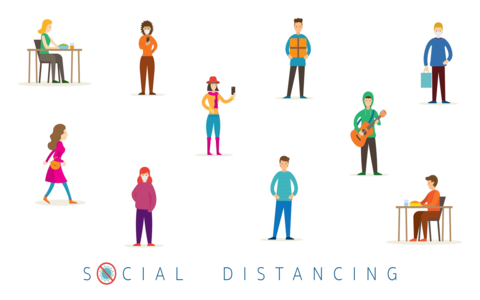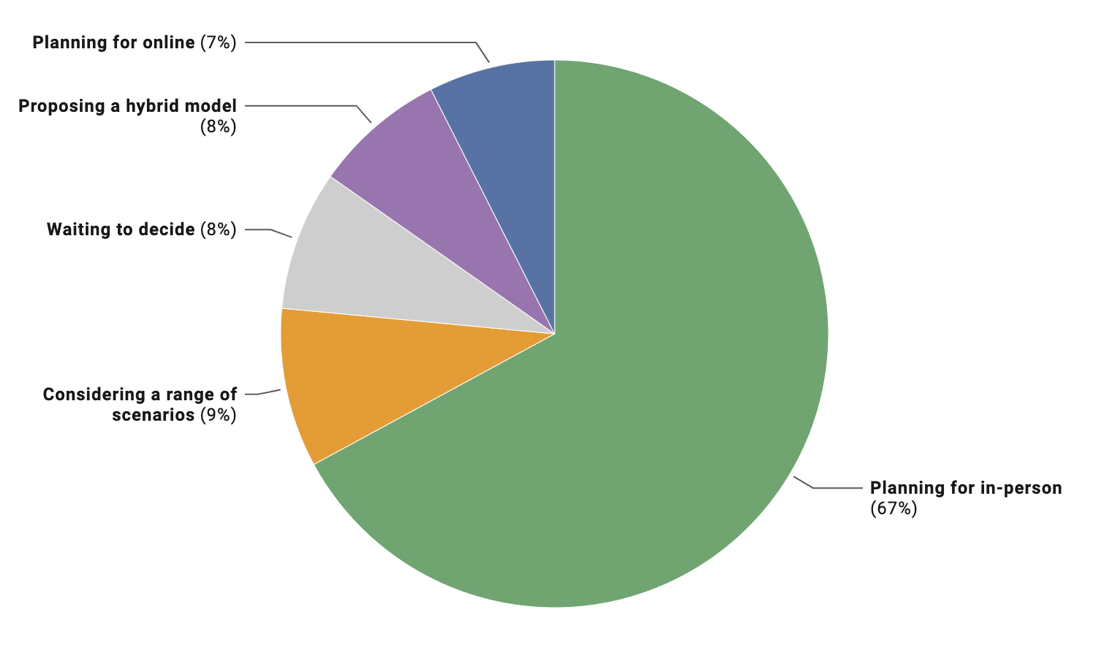The picture of what college will look like this fall is murky at best. The simple fact is, it is just too soon to tell, given the uncertainty of how the coronavirus will evolve and the unknown feasibility of new plans for academic and residential life. Some colleges have already made statements saying that they intend to be open for in-person classes, but with many social distancing policies in place. Some universities are planning for hybrid instruction, consisting of a blend of online and in-person learning simultaneously. Finally, a few institutions have already said that classes will be mostly online this fall.
Most colleges have stated that they plan to formalize and announce their fall plans between mid-June and the end of July. We hope this blog will give you an overview of this ever-changing situation and the modifications that colleges are considering due to Covid-19.
Factors Impacting Re-Opening
In a recent ACE survey of college presidents, 78% expressed concern about fall enrollment due to the coronavirus, projecting a decline of 15%. According to The Chronicle of Higher Ed, most colleges are planning for in-person classes for the fall semester. However, in-person will not look like college as usual.
Urban colleges might face greater challenges in keeping the virus out of campus than universities in more remote, rural locations. If colleges re-open for the fall semester and then close for a winter surge in cases, the spring semester could be in even greater jeopardy than the fall. Also, colleges may struggle to bring students back to campus during surge months if their student body is national rather than local. Regardless of what colleges have planned, the politics of the state could also determine reopening.
On-Campus this Fall
The Chronicle of Higher Education is tracking the fall plans of colleges. At present, based on the responses of 875 colleges, two-thirds are planning to be in-person in the fall.
Image credit: The Chronicle of Higher Education
Colleges that have plans to be open and in-person this fall are also developing many testing and social distancing measures, which may include any or all of the following:
Covid Testing
Testing students and faculty for Covid-19 as they come to campus and at designated times throughout the semester, as well as regimented plans for contact tracing and isolation
- Handing out thermometers to students and having them check in daily temperatures through an app in order to attend classes
- Temperature checks at the entrances of buildings
- Covid-19 antibody testing
Prevention and Treatment
- Students will be asked not to travel outside the local area while on-campus, or they will be asked to self-quarantine upon return
- Quarantine dorms are designated for sick or exposed students
Academics
- Spreading out class schedules
- Reducing class sizes, with large lectures online and smaller tutorials in-person
Residential and Social Life
- Students and faculty wear masks to class, dining halls, and public spaces
- “Book-end” attendance that only brings freshmen and seniors back to campus to reduce density
- Alternative scenarios include attendance on-campus for only freshmen or freshmen and sophomores
- Lower-density housing
- One-way walkways throughout campus
Dining
- Planned times for the same groups of students to use the dining hall facilities
- Cleanings between dining shifts
Colleges that have already announced in-person plans for the fall include Baylor University, James Madison University, New York University, Purdue University, and Wheaton College in Massachusetts.
Several colleges, including Creighton University, University of Notre Dame and University of South Carolina have plans to begin the fall semester in-person earlier in August with no breaks until Thanksgiving, and then move to online learning for the winter when virus cases are expected to surge again. They hope a compressed fall semester will allow for in-person classes before a late fall surge in virus cases begins.
Hybrid Instruction this Fall
The hybrid or HyFlex learning model offers in-person and online learning concurrently, and students can choose whether to participate in-person, online, or a combination of both. This is a teaching model that many universities are considering, because it offers options for at-risk staff and students who need to be online regardless, as well as the ability to switch seamlessly to fully virtual instruction should cases increase and campuses need to close.
Schools that are planning on a hybrid model for the fall include Rice University, San Diego State University, Tufts University, University of Pennsylvania, and USC.
Stanford has outlined a plan which includes a hybrid option, fewer undergrads on-campus, and an earlier start to the fall quarter. Stanford will switch to a four-quarter year, including the summer of 2021, hoping to give all undergrads the chance to complete at least two quarters of classes on-campus and requiring at least one quarter of classes to be taken virtually.
Mostly Virtual Learning This Fall
A few schools have decided to commit to fully online learning due to the high risks of the spread of Covid-19 in a campus setting. The California State University system plans for most classes to begin online in the fall at all 23 campuses. Six Harvard University graduate schools have announced that they will be completely online in the fall, including the T.H. Chan School of Public Health, Harvard Law School, Kennedy School, Graduate School of Education, Graduate School of Design, and Harvard Divinity School. In the U.K., the University of Cambridge stated that all lecture classes will be online-only until the summer of 2021, but they will consider having smaller teaching groups meet in-person.
Other Academic Options for this Fall
There are several other scenarios that colleges are considering for the fall. Beloit College has announced a block plan, which divides each term into two Mods, each containing two courses. Students will study two subjects intensively at a time, instead of the usual four, and courses will be offered in-person and online.
Macalester College is considering a delayed start as late as November, and Pomona College is considering delaying the start of the semester by a month or two or going online for a similar length of time, followed by a return to campus for the rest of the fall semester.
Some colleges are also looking into the modified tutorial model, in which students take an online lecture session and then meet with faculty or TAs in tutorials (small groups) that allow for social distancing. This mirrors the flipped classroom model in which foundational information is learned asynchronously by the student and more advanced discussions take place synchronously between students and faculty.
Study Abroad and Athletics
Most study abroad programs have been suspended for fall 2020 and sports programs also hang in the balance. Fall sports may take place without spectators or be cancelled altogether. UConn President Thomas Katsouleas has said that decisions about fall sports will be guided by the NCAA, not solely by college presidents or athletic directors. In addition, theater and vocal performances may be required to have limited or no attendance.
What Now?
We recognize that college is an important part of your life path and career, and that the coronavirus has upended many of your dreams and goals – for the time being. Keep an open mind and try to embrace these challenges as they arise. Tap into your inner core of patience and calm while colleges develop their plans. Have faith that eventually colleges will resume their operations and will use this opportunity to become stronger institutions of higher learning.
Colleges will have a clearer picture of what the fall will look like during the mid to late summer. For those students who find the prospect of in-person classes too risky or stressful, there will most likely be an online option for you to continue in your studies. For those who can’t wait to get to campus, you will probably be there at some point during the year.
At Collegiate Gateway, we understand the stress and anxiety surrounding these new changes in the college process. Please feel free to contact us—we’re always happy to help!


